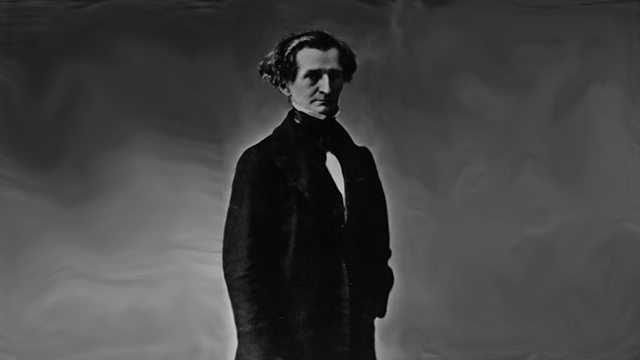
Revolution!
Donald Macleod explores the life and music of Hector Berlioz. Today, the July Revolution may be thundering around him, but he has a cantata to finish!
Donald Macleod explores the life and music of Hector Berlioz. Today, the July Revolution may be thundering about him, but he has a cantata to finish!
The Prix de Rome ‚Äď usually qualified by the adjective ‚Äėcoveted‚Äô ‚Äď was established in 1663, to encourage talented ‚Äėfine‚Äô artists: painters and sculptors. The Prize was a competitive bursary, paid for by the crown, that included an extended period of residential study in the Holy City. In 1720, the award was extended to architects, but it was not until 1803, more than a decade after the first French Revolution, that composers were eligible to enter; the first victor was Albert Androt, no longer a household name. By 1827, the year of Berlioz‚Äôs first attempt to win it, the Prix de Rome was recognised as the principal route to recognition for a French composer ‚Äď usually followed by a glittering career at the Paris Op√©ra. It took Berlioz four attempts to snag the vaunted gong, with his setting of The Death of Sardanapalus, the set-text for that year‚Äôs competition cantata. Presumably to avoid any chance of collusion, the contestants were locked away in the Institut de France for a maximum of 25 days ‚Äď Berlioz completed his setting in a mere 12, perhaps because he was impatient to join the revolutionary fray that was erupting outside the building. As he recalled in his Memoirs, ‚ÄúI dashed off the final pages of my orchestral score to the sound of stray bullets coming over the roofs and pattering on the wall outside my window‚ÄĚ. It was in the same year, 1830, that Berlioz unleashed his Symphonie fantastique on the world, and, less successfully, fell for the musically gifted Camille Moke. They were engaged to be married on Berlioz‚Äôs return from Rome, but Cupid ‚Äď in the form of Camille‚Äôs mother, whom Berlioz dubbed ‚Äúthe hippopotamus‚ÄĚ ‚Äď had other plans, and instead, Mademoiselle Moke tied the knot with another Camille: Pleyel, the celebrated piano manufacturer. Berlioz may later have derived some bitter satisfaction from the fact that their marriage lasted a mere four years ‚Äď due, it was said, to his former inamorata‚Äôs ‚Äúmultiple infidelities‚ÄĚ.
Claude Joseph Rouget de Lisle, arr Berlioz
La Marseillaise
Placido Domingo, tenor
Choeur et orchestre de Paris
Daniel Barenboim, conductor
La mort de Sardanapale (conclusion)
Daniel Galvez Vallejo, tenor
Pas-de-Calais North Regional Choir
Orchestre National de Lille
Jean-Claude Casadesus, conductor
Ouverture pour la Tempête de Shakespeare
San Francisco Symphony
San Francisco Symphony Chorus
Michael Tilson Thomas, conductor
Symphonie fantastique, Op 14 (3rd movement, Scène aux champs)
Philharmonia Orchestra
André Cluytens, conductor
Grand symphonie funèbre et triomphale, Op 15 (3rd movement, Apothéose)
The Wallace Collection
Leeds Festival Chorus
John Wallace, conductor
Produced by Chris Barstow for ¬ť∂Ļ…Á Wales
Last on
Music Played
-
![]()
Hector Berlioz
La Marseillaise
Performer: Pl√°cido Domingo. Orchestra: Choeurs et Orchestre de Paris. Conductor: Daniel Barenboim.- DG 437 638-2.
- DG.
- 2.
-
![]()
Hector Berlioz
La mort de Sardanapale (Conclusion)
Performer: Orchestre national de Lille. Singer: Daniel Galvez Vallejo. Choir: Nord Pas-De-Calais Regional Choir. Conductor: Jean‚ÄźClaude Casadesus.- NAXOS 8.555810.
- NAXOS.
- 3.
-
![]()
Hector Berlioz
Ouverture pour la Tempête de Shakespeare
Performer: San Francisco Symphony. Choir: San Francisco Symphony Chorus. Conductor: Michael Tilson Thomas.- RCA G010000267929D.
- RCA.
- 7.
-
![]()
Hector Berlioz
Symphonie fantastique, Op 14 (3rd movement: Scène aux champs)
Orchestra: Philharmonia Orchestra. Conductor: André Cluytens.- ERATO 9029588669.
- ERATO.
- 3.
-
![]()
Hector Berlioz
Grand symphonie funèbre et triomphale, Op 15 (3rd movement)
Ensemble: Wallace Collection. Choir: Leeds Festival Chorus. Conductor: John Wallace.- NIMBUS NI5175.
- NIMBUS.
- 3.
Broadcast
- Thu 14 Mar 2019 12:00¬ť∂Ļ…Á Radio 3
Beethoven Unleashed ‚Äď the box set
What was really wrong with Beethoven?
Composers A to Z
Who knew? Five eye-opening stories from Composer of the Week
Five reasons why we love Parry's Jerusalem
What is the strange power of Jerusalem which makes strong men weep?
A man out of time ‚Äď why Parry's music and ideas were at odds with his image...
The composer of Jerusalem was very far from the conservative figure his image suggests.
Composer Help Page
Find resources and contacts for composers from within the classical music industry.





